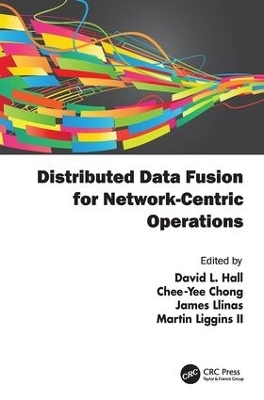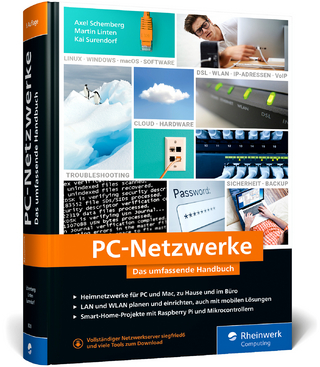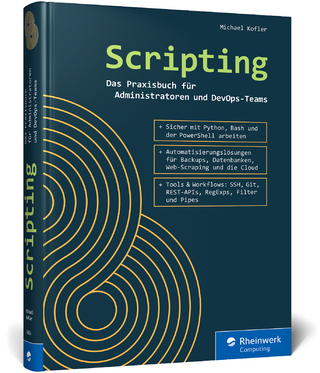
Distributed Data Fusion for Network-Centric Operations
CRC Press (Verlag)
978-1-138-07383-8 (ISBN)
Get Insight into Designing and Implementing Data Fusion in a Distributed Network
Addressing the entirety of information fusion, the contributors cover everything from signal and image processing, through estimation, to situation awareness. In particular, the work offers a timely look at the issues and solutions involving fusion within a distributed network enterprise. These include critical design problems, such as how to maintain a pedigree of agents or nodes that receive information, provide their contribution to the dataset, and pass to other network components. The book also tackles dynamic data sharing within a network-centric enterprise, distributed fusion effects on state estimation, graph-theoretic methods to optimize fusion performance, human engineering factors, and computer ontologies for higher levels of situation assessment.
A comprehensive introduction to this emerging field and its challenges, the book explores how data fusion can be used within grid, distributed, and cloud computing architectures. Bringing together both theoretical and applied research perspectives, this is a valuable reference for fusion researchers and practitioners. It offers guidance and insight for those working on the complex issues of designing and implementing distributed, decentralized information fusion.
Dr. David L. Hall is the dean for The Pennsylvania State University College of Information Sciences and Technology (IST). He also serves as a professor of IST and director of the Center for Network Centric Cognition and Information Fusion (NC2IF). Dr. Hall has industrial experience and has lectured internationally on the topics of multisensor data fusion, artificial intelligence, and research management and technology forecasting. Dr. Chee-Yee Chong is a chief scientist at BAE Systems Technology Solutions. He has been involved in distributed fusion research for over 25 years, starting with the Distributed Sensor Networks (DSN) program for the U.S. Defense Advanced Research Projects Agency (DARPA) in the 1980s. Dr. Chong’s research interests include centralized and distributed estimation, target tracking, information fusion, optimization and resource management, and application to real-world problems. Dr. James Llinas is a professor emeritus at the State University of New York at Buffalo. He created the Center for Multisource Information Fusion (CMIF) at the University at Buffalo, the only university research center conducting information fusion research in a systemic context, and is currently director emeritus of the Center. An expert on data fusion, he has lectured internationally on the subject for over 20 years, co-authored the first integrated text on information fusion, and has consulted extensively and internationally for many years. Martin E. Liggins II is an engineer with The MITRE Corporation. He has more than 20 years of research and development experience in industry and with the U.S. Department of Defense. He has performed fusion research in a number of areas, including sensor and data fusion, multisensor and multitarget tracking, radar, high-performance computing, and program management.
Perspectives on Distributed Data Fusion. Distributed Data Fusion: Overarching Design Concerns and Some New Approaches. Network-Centric Concepts: Impacts to Distributed Fusion System Design. Distributed Detection in Wireless Sensor Networks. Fundamentals of Distributed Estimation. Essence of Distributed Target Tracking: Track Fusion and Track Association. Decentralized Data Fusion: Formulation and Algorithms. Toward a Theoretical Foundation for Distributed Fusion. Object Classification in a Distributed Environment. A Framework for Distributed High-Level Fusion. Threat Analysis in Distributed Environments. Ontological Structures for Higher Levels of Distributed Fusion. Service-Oriented Architecture for Human-Centric Information Fusion. Nonmyopic Sensor Management. Test and Evaluation of Distributed Data and Information Fusion Systems and Processes. Human Engineering Factors in Distributed and Net-Centric Fusion Systems. Distributed Data and Information Fusion in Visual Sensor Networks. Index.
| Erscheinungsdatum | 23.04.2017 |
|---|---|
| Zusatzinfo | 25 Tables, black and white; 122 Illustrations, black and white |
| Verlagsort | London |
| Sprache | englisch |
| Maße | 156 x 234 mm |
| Gewicht | 453 g |
| Themenwelt | Mathematik / Informatik ► Informatik ► Netzwerke |
| Mathematik / Informatik ► Informatik ► Theorie / Studium | |
| Technik ► Elektrotechnik / Energietechnik | |
| Technik ► Maschinenbau | |
| Technik ► Nachrichtentechnik | |
| Technik ► Umwelttechnik / Biotechnologie | |
| ISBN-10 | 1-138-07383-0 / 1138073830 |
| ISBN-13 | 978-1-138-07383-8 / 9781138073838 |
| Zustand | Neuware |
| Haben Sie eine Frage zum Produkt? |
aus dem Bereich


